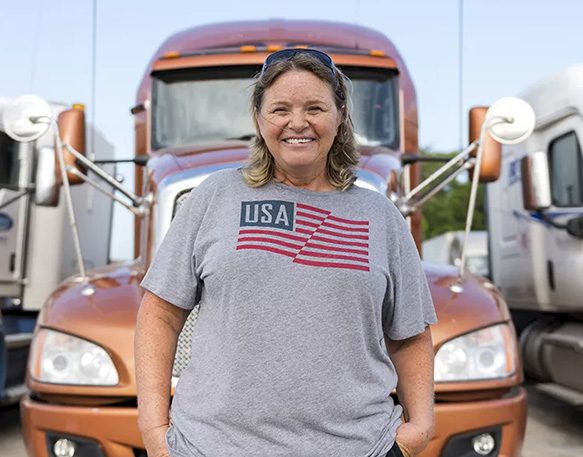Cash flow lifelines for truckers: Factoring explained
As a carrier or owner-operator, you know that maintaining steady cash flow is crucial for your business’s survival and growth. You also know that truckers often face delays in receiving payments from brokers, waiting weeks or even months to be paid for a load they’ve delivered. These delays can be a blow to a carrier’s financial stability, making it hard to cover essential expenses such as fuel and maintenance. This waiting game even forces many carriers to overextend credit or accrue debts just to keep their business running.
Freight factoring can offer a financial solution by getting you immediate cash in hand without having to take out a loan for your business. In factoring, a company purchases your invoices for a fee. This means that the factor pays you, with a small fee deducted. They take on your invoice and handle all of the follow-up with your original customer to collect repayment.
Here’s how factoring works:
1. Delivery: The carrier delivers the load and submits the invoice to the factoring company.
2. Advance payment: The factoring company pays the trucker a percentage of the invoice value upfront.
3. Collection: The factoring company takes over the responsibility of collecting the payment from the broker or shipper.
4. Final payment: Once the invoice is paid, the factoring company pays the remaining balance to the trucker, minus a small fee.
There are two main types of factoring: recourse and non-recourse. While both can ensure that you get paid promptly, understanding the nuances between recourse and non-recourse factoring can make all the difference in managing risks effectively. This guide will walk you through how to use these to optimize your business’s cash flow.
Two types of factoring
Factoring is a financial transaction where a business sells its invoices to a factoring company for a small fee. This allows the business to receive cash immediately, rather than waiting 30, 60, 90 days—or more—for the payment terms that were set on the invoice. Factoring agreements can be broken down into two main types: recourse and non-recourse factoring. Each type has distinct features, benefits, and risks that are important for carriers to understand.
Recourse factoring explained
In recourse factoring, a factoring company buys your invoices with the agreement that you will buy back any invoices that they cannot collect on. You receive payment upfront—either the full value of the invoice minus a factoring fee, or part of the value with the remainder paid once they have collected from your customer.
In a recourse factoring agreement, the carrier retains the risk. If the broker or shipper fails to pay, the trucker must reimburse the factoring company. This means there is no guarantee that you get to keep the funds the factoring company has paid you up front. This is why most recourse factoring programs will withhold the full funds owed to you until your customer has paid, so there is less impact on your immediate cash flow. This is the most common type of factoring, and it typically has lower fees due to the reduced risk for the factoring company.
Assuming this type of risk can strain smaller operations in particular. Recourse factoring is typically designed more for larger freight fleets, who can better absorb that risk of customer nonpayment. But factoring companies typically have some safeguards to prevent chargebacks. First, they will use a credit check system. While non-recourse factoring typically has higher credit standards for the brokers and shippers they will work with, all factoring companies will usually offer a free credit check on your customers before agreeing to factor the invoice, including the customer’s average days to pay. This can give you some security that the client is financially stable and trustworthy. Second, factoring companies have dedicated collections teams. This means that a specialized professional will work hard to collect invoice payments from your customers, taking that work off of your plate.
Again, recourse factoring is the most common form of factoring. It typically has lower fees, but also puts all the risk on you if your customer doesn’t pay the invoice.
Non-recourse factoring explained
Non-recourse factoring shifts the risk of nonpayment from the carrier to the factoring company. This means that if the customer is late or defaults, you still keep the money the factoring company paid you off the invoice. The factoring company not only takes over the responsibility of collecting the payment from the broker or shipper—if they fail to pay, the factoring company absorbs the loss.
Non-recourse factoring offers truckers peace of mind by eliminating the risk of nonpayment. However, this added security typically comes with slightly higher fees and stricter credit requirements for brokers and shippers the factoring company will work with.
In choosing a factoring partner, it is crucial to watch out for companies that call themselves non-recourse factors but that have hidden “exclusions” for when they will send you a chargeback—effectively making them recourse options with higher fees. Common exclusions include any invoices your customers dispute and invoices sent directly to customers instead of the factoring company. Make sure you read the fine print of your proposed contract and make sure you understand what the factoring company defines as “non-recourse.”
Key differences between recourse and non-recourse factoring
Understanding the differences between recourse and non-recourse factoring will help you make informed decisions for your carrier business. Here are some key factors to consider:
- Advance rates: Both types of invoice factoring offer advance rates, but recourse factoring often provides higher advance percentages because the carrier retains the risk.
- Fees: Non-recourse factoring usually has higher fees due to the additional risk borne by the factoring company.
- Speed: Both options can provide fast funding, typically within 24–48 hours.
- Qualification requirements: Non-recourse factoring has more stringent credit requirements for brokers and shippers to mitigate the factoring company’s risk.
Of course, the biggest difference between recourse and non-recourse factoring is who assumes the risk of customer nonpayment. In non-recourse factoring, the factoring company will take on that risk. In recourse factoring, you as the carrier will be responsible for failed customer payments.
The role of non-recourse factoring companies in the trucking industry
Non-recourse factoring companies play a vital role in supporting trucking businesses by providing financial stability and reducing risk. But remember that many companies that claim they offer non-recourse factoring include exclusions in their contracts that actually put the risk back on you.
Pros and cons of recourse and non-recourse factoring
Both recourse and non-recourse factoring have their advantages and disadvantages, and it’s up to you to decide what matters most for your needs and budget. Both factoring solutions will improve your cash flow and allow you to take back the time you would spend making phone calls and following up to collect payments on your invoices. Let’s take a look at a breakdown of the key difference between the two:
Recourse factoring pros:
- Lower fees
- Higher advance rates
- More flexible credit requirements for your customers
Recourse factoring cons:
- Risk of non-payment remains with the carrier
- Potential for chargebacks
Non-recourse factoring pros:
- Shifts risk of nonpayment to the factoring company, giving you peace of mind
- No chargebacks, offering greater financial security
Non-recourse factoring cons:
- Slightly higher fees
- Stricter credit requirements
- Often has lower advance rates
How to choose the right factoring option
The right factoring option will depend on your business’s specific needs. These include what a healthy cash flow looks like for your business, your risk tolerance, and your prior knowledge of your customer’s financial standing and average days to pay.
Here are some factors to consider to help you select the best factoring option for your business:
- Cash flow needs: Assess your immediate cash flow requirements. Do you need immediate cash in hand to keep your business moving and growing? While recourse factoring may come with a higher advance rate, non-recourse factoring can offer more financial stability by eliminating the risk of nonpayment.
- Customer creditworthiness: If your customers have strong credit histories, recourse factoring might be a suitable option. For less reliable customers, non-recourse factoring provides added security.
- Risk tolerance: Consider your willingness to assume the risk of nonpayment. Non-recourse factoring transfers this risk to the factoring company.
By considering these factors, you can choose a factoring option that best supports your business’s financial health and operational efficiency.
Making informed decisions: Your path to financial stability
Invoice factoring is a powerful financial tool for truckers, offering a way to optimize your cash flow to keep your business secure and help it thrive. Recourse factoring offers lower fees but means that you as the carrier retain the risk, while non-recourse factoring transfers the risk to the factoring company for a slightly higher factoring fee.
Reputable factoring companies like DAT Outgo provide true non-recourse factoring with additional benefits for your business, allowing you to focus on your core operations rather than following up on invoices or waiting for payments on loads you’ve already delivered. Explore factoring options today to keep your business adaptable and resilient, no matter the challenges ahead.
Are there any risks associated with invoice factoring?
With recourse factoring, if a customer doesn’t pay their invoice, the responsibility to cover the unpaid amount falls back on you as the carrier. Non-recourse factoring mitigates that risk by transferring the risk of nonpayment to the factoring company. Whether you choose to factor or not, there is the possibility that a customer will not pay. The key difference is that with factoring, you get immediate cash flow, but in recourse factoring you must be prepared to repay if the customer defaults. Studies have shown that working with a factoring company can improve a business’s retention or survivability. Ultimately, managing customer nonpayment risk is a reality whether you use factoring or not.
How quickly can businesses receive funding through invoice factoring?
The biggest advantage of invoice factoring is that it allows your business to get paid quickly so you can manage your cash flow. Once a factoring company approves your submitted invoice, most will pay you within 24 to 48 hours. Factoring can provide you with rapid access to cash, helping you maintain smooth operations and handle expenses without waiting for standard 30- to 90-day payment terms.
What happens if a customer doesn’t pay an invoice that has been factored?
The outcome of customer nonpayment on a factored invoices depends on the type of factoring agreement in place. In recourse factoring, your business is responsible for repurchasing the unpaid invoice from the factoring company—meaning that the risk of nonpayment ultimately falls back on you. In non-recourse factoring, the factoring company assumes the risk of nonpayment, so your business is not required to repay the advance. However, non-recourse agreements often have specific conditions and may not cover all scenarios of nonpayment. It’s crucial to understand the terms of your factoring agreement and to work with a trusted non-recourse factoring company like DAT Outgo.
What are the typical fees associated with invoice factoring?
Factoring companies charge a small fee that is usually calculated as a percentage on the dollar amount of the invoice—these rates usually start around 2% of the total invoice value. Rates and fees vary based on the factoring program type, the services your factoring company offers, and other factors. While a base rate of 2% may sound like nothing, many factoring companies add hidden fees on top of the base percentage, which can significantly increase the overall cost. These additional fees can include tiered rates, processing fees, collection fees, monthly minimum fees, and other surprise charges. This is why it’s essential to choose a factoring company that is transparent and honest about their fees.
Why is recourse factoring cheaper than non-recourse factoring?
Recourse factoring is generally cheaper than non-recourse factoring because it involves less risk for the factoring company. In recourse factoring, the carrier is responsible for repaying the advance they have received if the customer does not pay the invoice. This means the factoring company is protected from the risk of nonpayment, allowing them to charge lower fees. In contrast, non-recourse factoring transfers the risk of nonpayment to the factoring company, requiring them to assume a higher level of risk. To compensate for this increased risk, factoring companies typically charge higher fees for non-recourse factoring.
Stress-free freight factoring with DAT Outgo
Get paid within minutes with DAT Outgo. With transparent pricing and no hidden fees, DAT Outgo offers non-recourse factoring for your carrier business. Focus on the road while they handle the rest. Start factoring with DAT Outgo today for fast, reliable payments to improve your cash flow.




